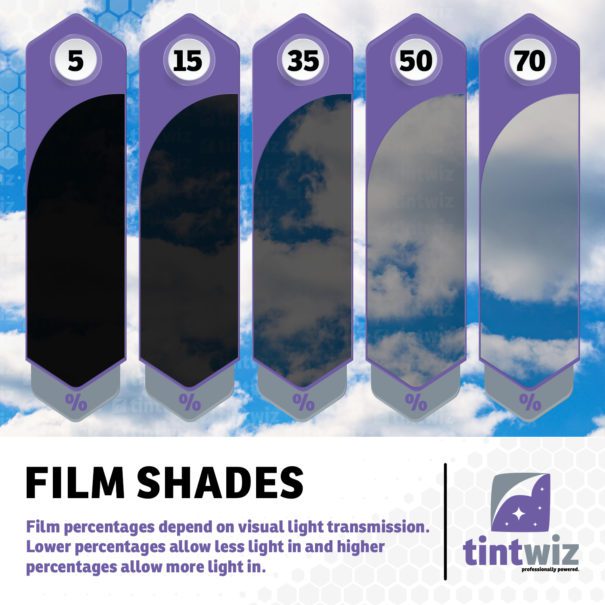Darkest legal tint for Cars in South Carolina
- Windshield: Non-reflective tint is allowed above the manufacturer’s AS-1 line.
- Front Side windows: Must allow more than 27% of light in.
- Back Side windows: Must allow more than 27% of light in.
- Rear window: Must allow more than 27% of light in.
Darkest legal tint for SUV and Vans in South Carolina
- Windshield: Non-reflective tint is allowed above the manufacturer’s AS-1 line.
- Front Side windows: Must allow more than 27% of light in.
- Back Side windows: Any darkness can be used.
- Rear window: Any darkness can be used.
Please note: The accuracy, completeness, adequacy or currency of the content is not warranted or guaranteed. We are not lawyers or a law firm and we do not provide legal advice. We recommend you consult a lawyer or other appropriate professional if you want legal advice.
South Carolina first enacted its window tint laws for vehicles nearly 30 years ago back in 1992, making it one of the earliest states to do so. This also means that many tint laws in SC were created long before many modern window film products were developed, so know that tint laws on the books may require lots of care to follow given their age and given all the new tint technologies developed in recent years.
To make sure your car (or larger vehicle) meets current South Carolina window tint law it’s a good idea to know the exact VLT percent (or visible light transmission percent, meaning how light and clear or dark and private the tint is) and to make sure it meets VLT% rules for each window of your auto type.
Car window tinting is a good investment for anyone concerned about both short-term function and looks of a vehicle as well as long-term re-sale value of the vehicle. In often warm, sunny South Carolina car tint adds privacy and style the first day it’s applied and it lowers cabin heat even during long, hot southern summer days, making the car cooler, more comfortable, and more cost effective based on reduced battery use and fuel savings through less AC use.
In the long term, window tint blocks 99% of the UV rays that cause interior fading, discolor, and cracking to upholstery and hard surfaces so a car will keeps its interior appearance and value.
Car window tint is a smart investment, but because illegal window tint in South Carolina can come with hefty fines and even jail time, you need to be sure your vehicle car tint meets with SC window tint laws.
Legal Windshield Window Film in South Carolina
As you get in most states, the rules regarding windshield window tint in South Carolina are easy to follow: you may apply a non-reflective window tint down to the vehicle manufacturer’s AS-1 line, which is a strip about inches below where the glass meets the roof. If you can’t tell the location of the AS-1 line, then use five inches as your guide for thickness of the tint strip. The same windshield tinting rules apply to all vehicle types in South Carolina.
Note most cars, trucks, and SUVs come with factory tint pre-installed on the windshield, so there is often no need to get this window film applied after market. (If your car does not have factory tint, you should get a = nonreflective window film applied, as this tint cuts sun glare, lowering eye strain and making driving safer.)
Car Window Tint Laws in South Carolina
In South Carolina, cars (meaning sedans, coupes, and hatchbacks) have different window tint laws than larger vehicles (like trucks, SUVs, and vans, collectively called MPVs, short for multi-purpose vehicles), so we are breaking down the rules by vehicle type separately.
Cars in South Carolina can have a window tint on side windows and rear windshield that allows at least 27% or more of the sun’s visible light into the car. This is more than a dark enough tinting to add privacy and to block sun glare, but 27% VLT tint also still allows some view into the car from up close, important for police officers doing traffic stops.
This 27% VLT window tint must not be reflective.
Auto Window Tint Rules in South Carolina for MPVs
The front side windows of vans, SUVs, and trucks in South Carolina must use the same standards as cars, with window tint no darker than 27% VLT. Rear side windows of MPVs can have any darkness of window film provided it does not go all the way to the top of the glass. Even blackout privacy tint that does not afford any view into the interior of the automobile is legal provided there is that clear strip at the top.
Rear windows (AKA the back windshields) may be tinted to any darkness under South Carolina rules without any upper strip needed. MPV tint cannot be reflective either.
Other Car Tint Rules in South Carolina
If the rear windshield of your vehicle is tinted South Carolina the rules stipulate that the vehicle must have dual side view mirrors in good working order.
As in many states, the window tint colors yellow, amber, and red are banned under South Carolina law, and as reflective tint is illegal, some metallic finish tints are also de facto illegal as they create a mirrored look.
No variance is allowed for tint darkness; the stated 27% minimum VLT is the rule.
Manufacturers and vendors of window tint in South Carolina are required to certify the film they sell as meeting state rules, so check with your vendor or installer to make sure your window tint is legal in SC.
Also, vehicle owners need to put stickers identifying tint as legal on every tinted window of the car. These stickers are not only required, but are a way to quickly deal with tint issue during a traffic stop or an inspection.
South Carolina tint rules do allow for some medical exemptions for darker window tinting, so if you have feel you have health issues like photosensitivity, skin disorders, or other medical conditions that merit darker window tint than that allowed by SC law, talk to a doctor and then to a tinting expert.
Window Tint Law Violations in South Carolina
Police assess window tint violations in South Carolina as misdemeanors, and the costs can be expensive. SC Window tint tickets cost a minimum of $200 and window tint violations can be much more expensive.
In extreme cases, authorities can also sentence window tint violators in South Carolina to up to 30 days of incarceration.








